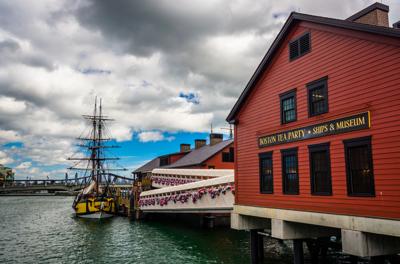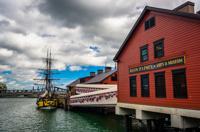BOSTON — Tea bags are coming in from all over the U.S. for a semiquincentennial bash in Boston.
Dec. 16 marks the Boston Tea Party’s 250th Anniversary, with reenactments, retrospectives, and, of course, the dumping of British tea into the Boston Harbor.
Spearheading these efforts is Revolution 250, a consortium of more than 70 Massachusetts organizations working to make all of the day’s events.
The Old South Meeting House, Downtown Crossing, Harborwalk and Faneuil Hall will be flooded with Bostonians and those visiting to commemorate the occasion, according to Revolution 250 Executive Director Jonathan Lane.
Lane told the Herald that the reenactments and celebrating a pivotal point of our nation’s history should not solely be focused on Boston, with other communities within the state playing a vital role in gaining independence.
“When we talk about the revolution, we want to talk about not just about the Boston Tea Party, and Lexington and Concord, we want to talk about the people of Great Barrington, Worcester and Bristol County,” Lane said. “Every community has a stake in this narrative, and we want every community to feel like they have a story to tell we want to work with them to tell that story.”
Evan O’Brien, creative manager for the Boston Tea Party Ships & Museum, said that they have received tea from all 50 states and other parts of the world sent in for a variety of reasons to be dumped.
“Some people want to have their tea sent in to participate and receive a certificate, which is a great reason to do it, but others are using this opportunity to talk about causes that matter to them, whether personal or political,” he said. “We even received 250 pounds of tea from the East India Company, still in London.”
Whether the bulk send comes as a tongue-in-cheek gesture or not, O’Brien said, there is a wide array of reasons people of all ages and backgrounds wish to partake in this demonstration from all over the world.
O’Brien said the story of the American Revolution and its events is not a “dead story” and is something the public should always keep in their minds when thinking about present-day America.
A direct descendant of Sons of Liberty member William Breck, Lane expressed what leading the charge of this commemoration means to him, his family and the families of other Sons of Liberty descendants.
“In talking about my ancestors, there is an element of humble pride,” Lane admitted. “I am very proud of the fact that they recognized their rights and liberties in the same way I feel about people who decided to emigrate to America.”
Lane explained that America is going through a different type of revolution now compared to America’s Bicentennial in 1976. A divisive nation just out of the Vietnam War and recovering from the political scandal that was Watergate was riddled with racial disdain and economic uncertainty.
His perspective of the Bicentennial as a 10-year-old on the South Shore of the Bay State, he said, was a point in time that took a break from the chaos of everyday life and focused on how these communities comprised of ordinary people made up this nation celebrating 200 years of freedom from British rule.
“You really can, through public service, public charity and nonprofit support, build a strong and vibrant community without being president of the United States,” Lane said. “I think that’s really something that I would love to see come out of the 250th anniversary.”
Shawn Ford, executive director of the Boston Tea Party Ships & Museum, emphasized Lane’s point, noting that the revolt in Boston and many other critical moments leading up to the Declaration of Independence were fueled by average citizens doing extraordinary things.
“Who of us today would be willing to throw our livelihood, our families, our fortunes at property out the window, based on an idea that had a 100% chance of failure,” Ford said. “People today don’t always understand the significance of what happened 250 years ago.”
Ford emphasized that the public should also realize that the Boston Tea Party had nothing to do with taxation or tea, but rather had everything to do with representation. Without the Tea Party occurring and those ordinary citizens making their opposition towards the British known, he said, who knows what present-day “America” would look like?
“We could still be British today,” Ford said. “That’s unfathomable to think about. We could still be part of the British empire if the Tea Party didn’t happen. The fact is, what happened in Boston 250 years ago and what continues to happen here in Boston today, changes the world.”
Distributed by Tribune Content Agency, LLC.



